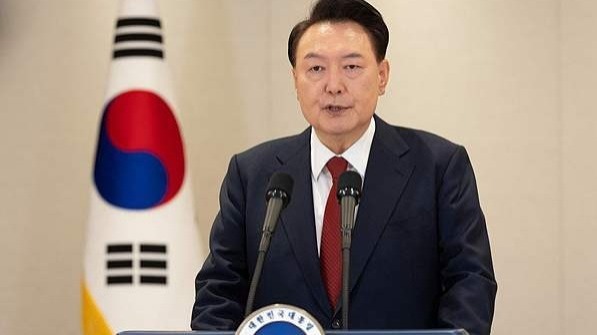Xinhua News Agency, Seoul, January 4 Title: The arrest of Yoon Seok-yue is blocked and South Korea’s political turmoil is difficult to resolve
Xinhua News Agency reporter Lu Aihua Feng Yasong Ji Xinlong
South Korea’s Senior Public Officials Crime Investigation Service (Public Investigation Service) executed an arrest warrant for suspended President Yoon Seok-yue on the 3rd, but was blocked by the Presidential Security Service. After several hours of standoff, the Public Information Office announced that the operation had failed and suspended execution of the arrest warrant.
Analysts pointed out that this incident reflects the practical difficulties faced by the Public Relations Office in carrying out operations under the current political and legal system of South Korea. Regarding the Yin Xiyue impeachment case and the arrest warrant issue, the confrontation between South Korea’s government and the opposition has intensified, public opinion is divided, and South Korea’s political turmoil may be difficult to resolve in the short term.
Guard blocks arrest warrant but fails
On the morning of the 3rd, personnel from the Public Relations Office and the police arrived at the presidential residence in Hannam-dong, Yongsan District, Seoul, planning to arrest suspended President Yoon Seok-yue. When they arrived about 200 meters in front of the official residence, they were blocked by a human wall composed of more than 200 soldiers and security personnel, and a physical conflict broke out between the two sides. Investigators presented an arrest warrant to the Chief of Presidential Security in front of the official residence, but the Chief of Presidential Security stated that “the search was not allowed” under the Presidential Security Act. After several hours of confrontation, the Public Relations Office announced the suspension of arrests and the evacuation of the presidential palace.
After the arrest failed, South Korea’s “Joint Investigation Headquarters” jointly established by the South Korean National Police Agency, the Public Relations Office and the Ministry of National Defense stated that in view of the current situation, it is actually impossible to execute the arrest warrant if the Presidential Guard continues to fail to cooperate.
On December 31, 2024, the Western District Court in Seoul, South Korea issued an arrest warrant for Yin Xiyue on suspicion of initiating civil unrest and abusing power. This is the first time in South Korea’s constitutional history that an arrest warrant has been issued for a sitting president. Yin Xiyue’s legal team stated that the arrest warrant and seizure and search warrant applied for by an investigative agency that does not have the power to investigate civil disorder crimes are illegal and invalid.
Previously, the “Joint Investigation Headquarters” asked Yin Xiyue to come to the case for investigation three times on the grounds of suspected civil strife and abuse of power, but Yin Xiyue did not attend. Analysts believe that Yin Xiyue, a former prosecutor, is well versed in legal loopholes and has exploited legal loopholes many times in an attempt to “delay” the situation until the situation is reversed.
Insufficient power makes it difficult for the Public Relations Office to break the situation
The arrest warrant is valid until the 6th of this month. When the Public Relations Office suspended the execution of arrests and evacuated the presidential palace, it said that it was still difficult to determine whether the arrest warrant would be executed again.
Yonhap News Agency quoted sources from the legal community as reporting that the Public Relations Office plans to try to execute the arrest warrant again before the expiration of the 6-day validity period after consultation with the police. However, some analysts pointed out that if the implementation fails again, the Public Relations Office will face more pressure from public opinion. Therefore, the Public Investigation Office may re-apply for the issuance of an arrest warrant after the six-day validity period, and will carefully decide the execution time after comprehensively evaluating various possibilities and response plans.
After the initial arrest operation failed, the “Joint Investigation Headquarters” stated that it had opened a case against relevant personnel of the Security Division on suspicion of obstructing the performance of special official duties, and required the Director of the Security Division and the Deputy Chief of Security to come to the case for investigation on the 4th. The Public Relations Office also stated that it will strongly request Choi Sang-mok, the command supervisor of the Security Office and acting president, to order the Security Office to cooperate in the execution of Yoon Seok-yue’s arrest warrant.
Analysts pointed out that these statements are paving the way for another arrest. However, when the two parties to the dispute are in a stalemate, neither the acting president, who has a weak power base, nor the presidential office, which is in an embarrassing situation, may find it difficult to lend a helping hand at the request of the Public Relations Office.
South Korea’s Constitutional Court is speeding up the impeachment trial of Yoon Seok-yue. According to Yonhap News Agency, the Constitutional Court has set the dates for the next five court hearings and the schedule is tight. Some analysts pointed out that considering the negative impact such as the political chaos caused by the presidential impeachment case, the Constitutional Court strives to hear the case as quickly as possible.
Public opinion is divided and confrontation between the government and the opposition intensifies
Regarding Yin Xiyue’s departure, South Korean public opinion is showing a polarizing trend: on the one hand, recent polls in South Korea show that more than 70% of the respondents support the impeachment of Yin Xiyue; on the other hand, conservative groups who are Yin Xiyue’s “iron fans” are hostile to him. support is gradually increasing.
After the arrest warrant for Yin Xiyue was issued, South Korean people who supported and opposed Yin Xiyue gathered to protest and demonstrate near the presidential residence, and the two sides faced off across the street. According to Korean media reports, on the day the Public Relations Office carried out the arrest operation, more than 10,000 people supporting Yin Xiyue came to the scene. People who opposed Yin Xiyue also rallied at a subway station close to the presidential residence, urging the arrest of Yin Xiyue.
In addition to the people, the ruling and opposition parties are also confronting each other. Kwon Yeong-se, chairman of the Emergency Countermeasures Committee of South Korea’s ruling National Power Party, said that the Public Investigation Office’s execution of the arrest warrant for the president was an “extremely unfair overreach and improper act” and believed that “the Public Investigation Office obtained the arrest warrant through a transaction with a judge.” Yun Xiangxian, a member of the National Power Party, said that executing the arrest warrant was a serious violation of the constitution and the director of the Public Investigation Department should be impeached.
South Korea’s largest opposition party, the Democratic Party of Korea, strongly criticized Yoon Seok-yue’s refusal to cooperate with the execution of the arrest warrant. Park Chan-dae, the floor representative of the Democratic Party of Korea, called on the National Power Party to “stop supporting the chief culprits of civil strife that undermines constitutional order and democracy” and said that Yoon Seok-yue should receive an arrest warrant.
Analysts pointed out that the confrontation between South Korea’s ruling and opposition parties and their supporters has intensified recently. Joan Cho, a professor of Korean politics at Wesleyan University in the United States, believes that the polarization of South Korea’s political situation is reflected both at the elite level and at the mass level, which has seriously affected South Korea’s political stability. Cha Weide, a professor at Georgetown University in the United States, said that continued political chaos will further aggravate South Korea’s existing economic and social problems.
[Editor in charge: Yan Yujie]








